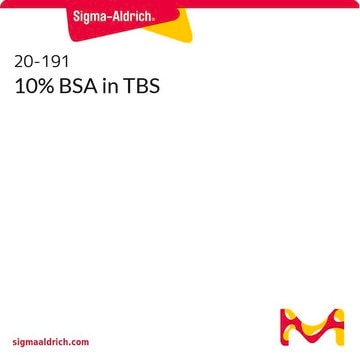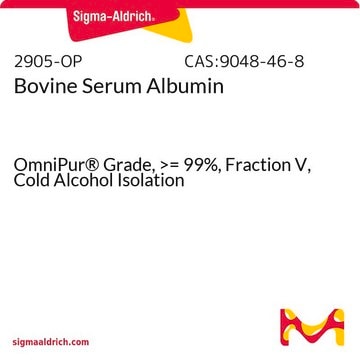126615
Bovine Serum Albumin
10% Aqueous Solution, Nuclease-Free
Synonym(s):
Albumin, Bovine Serum, 10% Aqueous Solution, Nuclease-Free
About This Item
Recommended Products
product name
Albumin, Bovine Serum, 10% Aqueous Solution, Nuclease-Free,
form
liquid
Quality Level
manufacturer/tradename
Calbiochem®
storage condition
OK to freeze
impurities
≤0.02% Fatty acids
≤10 ppm Heavy metal
≤2.0% Ash
foreign activity
Nuclease, none detected
Protease, none detected
shipped in
ambient
storage temp.
2-8°C
General description
Warning
Physical form
Legal Information
Storage Class Code
12 - Non Combustible Liquids
WGK
WGK 3
Flash Point(F)
Not applicable
Flash Point(C)
Not applicable
Certificates of Analysis (COA)
Search for Certificates of Analysis (COA) by entering the products Lot/Batch Number. Lot and Batch Numbers can be found on a product’s label following the words ‘Lot’ or ‘Batch’.
Already Own This Product?
Find documentation for the products that you have recently purchased in the Document Library.
Customers Also Viewed
Related Content
Our broad range of the most trusted tools for cell culture includes stringently sourced and tested FBS, established media formulations, and sterile labware. Cutting-edge techniques using stem cells and 3D matrices are enabled by organoids, hydrogels, culture scaffolds, and bioinks for 3D bioprinting.
Our broad range of the most trusted tools for cell culture includes stringently sourced and tested FBS, established media formulations, and sterile labware. Cutting-edge techniques using stem cells and 3D matrices are enabled by organoids, hydrogels, culture scaffolds, and bioinks for 3D bioprinting.
Our broad range of the most trusted tools for cell culture includes stringently sourced and tested FBS, established media formulations, and sterile labware. Cutting-edge techniques using stem cells and 3D matrices are enabled by organoids, hydrogels, culture scaffolds, and bioinks for 3D bioprinting.
Our broad range of the most trusted tools for cell culture includes stringently sourced and tested FBS, established media formulations, and sterile labware. Cutting-edge techniques using stem cells and 3D matrices are enabled by organoids, hydrogels, culture scaffolds, and bioinks for 3D bioprinting.
Our team of scientists has experience in all areas of research including Life Science, Material Science, Chemical Synthesis, Chromatography, Analytical and many others.
Contact Technical Service










